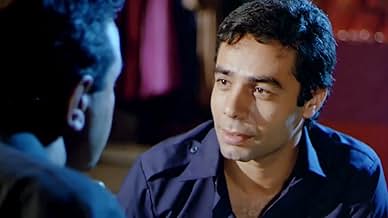In the middle of his own heart surgery, an Egyptian filmmaker remembers his life. In fact his old self, as a child, is accused of the attempted murder of his new self. Through the metaphoric... Read allIn the middle of his own heart surgery, an Egyptian filmmaker remembers his life. In fact his old self, as a child, is accused of the attempted murder of his new self. Through the metaphoric trial, we are drawn into his life in relation to the Egyptian revolution, his constant ne... Read allIn the middle of his own heart surgery, an Egyptian filmmaker remembers his life. In fact his old self, as a child, is accused of the attempted murder of his new self. Through the metaphoric trial, we are drawn into his life in relation to the Egyptian revolution, his constant need for success, and the effect the American Dream has on him.
- Awards
- 1 nomination total
- Yehia
- (as Nour El-Cherif)
- Nadia young girl
- (as Laila Hamada)
- Director
- Writer
- All cast & crew
- Production, box office & more at IMDbPro
Featured reviews
I like it
This film is very special and unique. Chahine has been compared to Fellini in the past and here he is making one of his three autobiographical, slightly surrealist dramas, though I think that comparing this to Fellini's "8 1/2" is taking things a bit far and can only be described as having a narrow vision of world cinema.
The concept is certainly interesting, we meet Yehia many years after we saw him in "Alexandria... Why?", and he is undergoing heart surgery and starts to remember his entire life and see it from a detached perspective. If "Alexandria... Why?" barely tried to conceal that fact that it was an autobiographical film, then "Egyptian Story" doesn't even bother, referencing by name and content several of director Chahine's celebrated early films including "Bab El Hadid (Cairo Station)" and "Djamila". These are in my opinion the best scenes in the film. The film starts well enough, but the first hour is less fascinating than the second hour, which from start to finish is quality cinema (outside of the cheapness of the set for the trial, but I've done too much complaining about that already).
This film assumes a level of familiarity with Chahine's earlier work, and of particular interest are the scenes surrounding the making of his masterpiece "Bab El Hadid" (English title: "Cairo Station"), where we see the influences that lead to the writing of the film as well as the filming of one of its most memorable and crucial scenes and a hilarious sales pitch for the film, where Yehia sold the film essentially as pornography, a scene that apparently mirrors actual events, and not surprisingly, as films about sexually frustrated cripples weren't exactly common in Egypt in 1958 (the film was banned for no less than 20 years following its release, as well). The scenes that follow, with Yehia's (really Chahine's) frustration over his near-win for Best Actor at Cannes (which is really saying something, considering the fact that he has only acted in four films to this date), and nervousness over his film's performance at Berlin and at Cannes providing a candid and rare look at an artist's feelings toward his work.
The film is technically excellent, the camera is used beautifully and the film looks splendid outside of its obvious lack of a real budget. The acting is mostly solid, with Nour El-Cherif in the lead role giving one of the best performances of the entire decade as far as I'm concerned.
This is a difficult film, for sure, but despite its often considerable flaws, it's a cinematic tour de force and one of the most fascinating documents of a great director's work there has ever been. It's a perspective we don't see often and hence it always feels fresh and interesting. Well-directed for sure, and mostly quite brilliantly-written, Chahine's second installment in his autobiographical trilogy is well worth your time.
8.5/10
There are elements of "8 1/2" and "All That Jazz" in the story of a film maker who faces a trial in which the child and young man he was testify against the person he has become. The surrealist settings are cheap but fun and the central performance is nicely done. The many characters and switches in time are a bit complex and it helps to have a little knowledge of modern Egyptian history, but there is humor and insight worth your time.
Did you know
- TriviaThe Egyptian version of "All that Jazz"
- GoofsThe taxi driver quotes Shakespeare: "And now time doth waste me", incorrectly referring to it as a quote from Hamlet. The quote is actually from Richard II (Act 5, Scene 5).
- ConnectionsFeatures Le fils du Nil (1951)
- SoundtracksHadduta Misrija
by Mohamed Mounir
- How long is An Egyptian Story?Powered by Alexa
Details
- Release date
- Country of origin
- Languages
- Also known as
- An Egyptian Story
- Production company
- See more company credits at IMDbPro
Contribute to this page


























